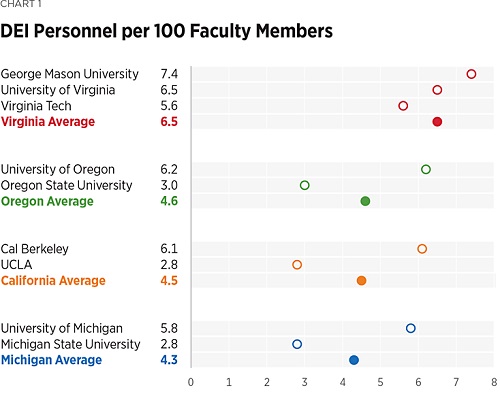DEI programs raise tuition costs
Going into an election year, the conversation is all about uniting – uniting the party, uniting the country, uniting the state, uniting the legislature. While they are busy campaigning for unity, bills are passed that do the opposite with a big price tag. Diversity, equity and inclusion (DEI) is a money guzzler that drives a wedge to divide.
Of deep concern is the amount of education funds that are spent on DEI. The Heritage Foundation has just
published a study measuring how many Diversity, Equity, and Inclusion (DEI) “instructors” there are at major public state universities. The analysts measured the size of DEI bureaucracies in the 65 universities that were members of one of the Power 5 athletic conferences (the Big Ten, the Big 12, the Pac-12, the Southeastern Conference, and the Atlantic Coast Conference) in 2021.
The study reported that DEI staff and departments urge students to embrace radical leftwing ideologies, including that people should be treated differently due to their race. Ideological indoctrination is utterly unacceptable at taxpayer-funded universities and the DEI bureaucracy should be abolished in state-funded schools.
DEI bureaucracies are better understood as an academic version of a
political commissariat that articulates and enforces an ideological orthodoxy on campus. That orthodoxy tends to make many groups of people feel unwelcome, promotes division, and encourages conformity rather than diversity on various social and political issues.
Heritage analysts found that surveys of students reported worse
campus climates—measured, for example, by how accepted or respected students feel at the campus—at universities with larger DEI bureaucracies than at those with smaller DEI staff.
The worst state is Virginia with 6.5 average DEI personnel for every 100 faculty members on the payroll that the researchers could identify. Oregon came in second with an average 4.6. However, University of Oregon exceeded all but the top two universities in Virginia at 6.2 DEI ratio. Oregon State University in the Power 5 conferences in 2021, has much smaller DEI bureaucracies pulling down the average with a 3.0 DEI. Both schools exceeds UCLA at 2.8 and U of O exceeds Cal Berkeley at 6.1 DEI.

For the academic year 2021-2022, the average undergraduate tuition & fees of 4-year Oregon colleges is $12,907 for in-state and $31,542 for out-of-state. Its tuition & fees are higher than the national average, which is $6,979 for in-state students and $12,905 for out-of-state students. Both Oregon State University and University of Oregon's undergraduate tuition and fees for the academic year 2022-2023 raised to $15,054 for Oregon residents and $41,700 for out-of-state students,
It isn’t enough that the University of Oregon provides services to help the underserved manage their way through college, but it operates five units in the
DEI Division with 24 staff and 10 student staff. It runs a multicultural center and sponsors events and activities. It funds units and groups that offer grant opportunities to staff for professional development and external mentoring along with financial sponsorships for DEI programs.
A D V E R T I S E M E N T

A D V E R T I S E M E N T
U of O operates DEI websites and working groups with resources that doesn’t have a uniting theme or scholarly benefit and are indoctrinating in general. For instant, the Deconstructing Whiteness Working Group (DWWG) consists of a number of employees who lead monthly self-work meetings to reflect on their complicity in white supremacy, anti-Blackness, and racism. In previous years, the group has facilitated a "What's Up With Whiteness?" retreat that aims to help participants find their place in conversations around race and systemic injustice in their own lives.
Then there are DEI groups with a philosophical bent: L.A.C.E. (Love, Authenticity, Courage, Empathy) embodies the universal tenets of Love, Authenticity, Courage and Empathy. These interlocking values represent the being and doing of individuals and the institutions in which they engage. Other strategies groups interact and advocates for issues within the community, which may be helpful if it’s a supporting role. But to often it is the opposite.
The Heritage study suggests that rather than raise tuition next year, states should defund DEI programs that drain resources from classrooms and instructions.
--Donna Bleiler| Post Date: 2023-09-29 13:15:27 | Last Update: 2023-09-29 00:05:38 |








